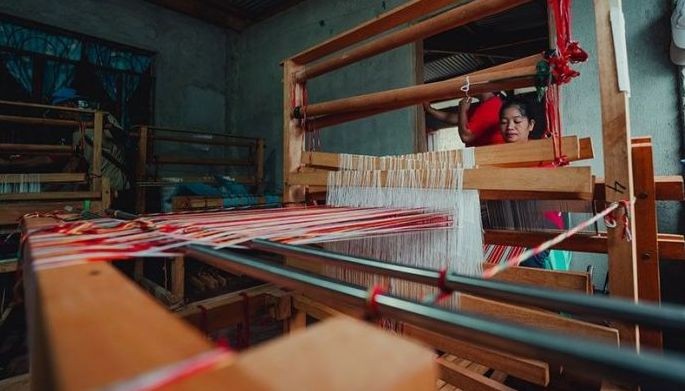Fashion
'Slow' fashion keeps Twali-Ifugao's culture alive in Nueva Vizcaya

In Barangay Capisaan in Kasibu, Nueva Vizcaya, women practice traditional loom weaving.
MANILA, Philippines — If in food we have fast foods, such as burgers, hotdogs, fries and soda, threatening the very existence of slow food (or traditional dishes cooked the long and arduous way), in the world of fashion there is such a thing as fast fashion and slow fashion.
Fast fashion is low-priced stylish clothing bought from retail stores. Their designs are based on current trends that may be replaced by other trends sooner or later. Slow fashion refers to clothes made with traditional loom materials woven by Indigenous Peoples (IPs). While our streets and public places are overwhelmed with fast fashion nowadays, the nostalgia trend is emerging in today’s generation. People are now embracing back slow fashion, as consumers put premium value on sustainability and quality.
With the rise of slow fashion, traditional loom weavers can take advantage of changing consumer behavior.
Traditional loom-weaving takes time and effort.
Traditional loom-weaving methods, practiced for centuries by IPs, are a sustainable approach to fashion as they opt to use locally sourced materials. Made with utmost care and precision, woven pieces reflect the hard work of their weaver.
With close to 17 million indigenous peoples in the Philippines, the country is rich with cultural expressions, but the United Nations Office for Project Services also pointed out that they are among the most disadvantage peoples. Protecting indigenous culture and promoting the handloom weaving industry need public, private and civil society interventions.
In Barangay Capisaan in the upland town of Kasibu in Nueva Vizcaya, Alayan Pag-asa Abot-Palad Association of Women are trying to keep their Ifugao-Twali culture alive through weaving. They are among the pilot beneficiaries of the Loom Weaving Industry program of the Department of Trade and Industry (DTI) – Nueva Vizcaya (Region 2) in 2014.
Among the women weavers’ association’s products is the famous Ifugao shawl crafted in a chain rib weave with embroidered seams. These shawls are worn in various ways, including as a skirt or as a scarf.
For those who are looking for a full attire, the Twali-Ifugao weavers also make skirts that pay homage to ancestral woven patterns.
Livelihood projects involving traditional loom weaving is thriving in Barangay Capisaan.
To increase their economic viability, Barangay Capisaan, Municipality of Kasibu, the Didipio Mine of OceanaGold (Philippines) Inc. and DTI Region 2 have forged the Mun-Abol (Maximizing Network and Unveiling Natural Talents through Acceleration of Business Opportunities and Livelihood) Project to strengthen the industry through upskilling, training and capital equipment financed through the Didipio Mine’s IP Culture Revitalization Program. The project’s name, “Mun-Abol” is an Ifugao term meaning “to weave.”
With an established front store named Mun-Abol Capisaan Weaving, the project supports 16 women weavers, most of whom are mothers, with an additional source of income.
Barangay Capisaan is among the 11 communities supported by the Didipio Mine’s social development and management program.
“The Mun-Abol Project is more than just a social enterprise; it’s a vibrant tapestry of culture, creativity and community empowerment. Rooted in the rich traditions of Indigenous Peoples, this project weaves together threads of heritage and innovation to support the orange economy and revitalize creative culture,” said Didipio Mine Community Development Supervisor Vincent Flores.
Apart from its contribution in the Mun-Abol Project, OceanaGold (Philippines) Inc. has also established a scholarship program for college students from various indigenous communities in Nueva Vizcaya and Quirino, and sponsors community trainings of indigenous dances for the youth, thus keeping the culture alive.
Signing of Memorandum of Agreement for the Mun-Abol Project in August 2023.
“This project increases our livelihood sources while transferring our knowledge of weaving to the next generation,” said Capisaan Barangay Captain Patrick Batulon.
Visitors in Nueva Vizcaya should never leave the province without dropping by Mun-Abol Capisaan Weaving’s shop in Kasibu. The only other way to order their woven products is to send them a message on Facebook.
RELATED: Ilocos Norte inaugurates new weaving center as tribute to national living treasure’s 99th birthday


)






